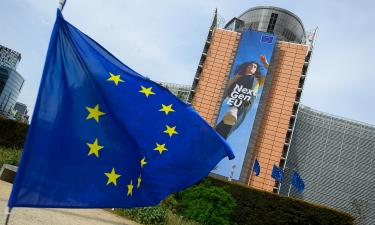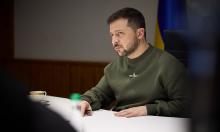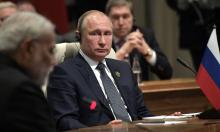Next Georgian government will be military?
Saakashvili's policy creates all conditions for the Georgian military to come to power
The director of the Caucasian Media Institute, Alexander Iskandaryan, maintained in his recent interview to REGNUM information agency that Georgia experiences the process of the rapid “latinamericanization”.
 In the opinion of this renowned expert of the Caucasian region, Georgia will keep on receiving the U.S. money, even it will be embezzled and spent on private villas. The consequent drawbacks for Georgia are the regress of democracy, freedom of media and the obvious politicization of the economy. But the biggest outcome is an emergence of the specific political culture. The Georgian citizens seem to have already got used to the fact the government changes occur in semi-legal way, on the streets.
In the opinion of this renowned expert of the Caucasian region, Georgia will keep on receiving the U.S. money, even it will be embezzled and spent on private villas. The consequent drawbacks for Georgia are the regress of democracy, freedom of media and the obvious politicization of the economy. But the biggest outcome is an emergence of the specific political culture. The Georgian citizens seem to have already got used to the fact the government changes occur in semi-legal way, on the streets.
Summing up his not-so-complimentary to the Georgian democracy analysis, A. Iskandaryan nevertheless comes to the quite optimistic conclusion: “Sooner or later this kind of countries, tired of the permanent coups, comes to the way which we call European.” However some countries of Latin America can hardly be called inspiring examples of the transition to democracy, they rather testify to the fact that such countries can stay in the impasse of the social development during decades and a way out of it is not guaranteed.
The example of Latin America can become contagious not as an example of a successful democratization but in the opposite. Historically the particular political influence in Latin America belonged to the military. The results of their rule have always been disastrous for a society. But at least in one respect the military rule proved to be more effective than the civil one: namely in suppressing riots and revolts of an impoverished populace.
Saakashvili announced in May that he's ready to the “popular disappointment” and admitted for the first time the possibility of his resignation because of the social discontent: “The reformers shouldn't hope that they'll be able to maintain the joyful mood in a society. They'd better reconcile themselves to the imminent disappointment of the voters, and they will have to go”. Who can come to take the “rose” Georgian reformers' place? A new edition of civil chatterboxes like Gamsakhurdia-Shevarnadze-Saakashvili or a new, better organized, disciplined and, chiefly, more favorable for the only superpower, force?
Saakashvili's policy creates all conditions for the Georgian military to come to power. In April the Georgian parliament approved the governmental amendments to the state budget of 2005. As a result the defense spending will reach an unprecedented in the post-soviet Georgia sum – $ 324 million. It accounts for 21.4 % of all state expenditure or 6 % of the GDP. For the country not at war this level of the militarization is unique; it is the highest figure in the Commonwealth of Independent States: in 2005 Russia is to spend on the defense circ. 3 % of the GDP, Belorussia, declared by Saakashvili “a tyranny” – only 1 %. It is remarkable that initially the sum allotted on the defense wasfive (!) times less: only $ 65 million or 1.2 % of the GDP.
The military reform should be finished by 2006, and Georgia is supposed to get a more efficient army, numbering 30 000 troops: 23 000 in the army, 7 000 in the reformed border guard. The military infrastructure is under construction.
The construction of the up-to-date military base for 3 000 servicemen will be finished near the city Senaki in November of this year. Georgia intensifies purchasing of the arms: the fighters MiG-23 were acquired in Uzbekistan, the light combat aircrafts L-159 in Czech Republic, 122-mm artillery systems in Bulgaria, helicopters and air defense systems in Ukraine. Lithuania is going to hand over to Georgia two warships and 14 000 Kalashnikov assault rifles.
The masterful political demagogue, M. Saakashvili rules with authoritarian methods and is obviously unable to lead the country out of the deep socio-economic crisis. The minimum wage in Georgia is 40 lari (circ. $ 20), pension – 28 ($ 14), when a liter of milk costs 1 lari ($ 0.5), a loaf of bread 0.5 ($ 0.25). The fact that at a time of such socio-economic crisis one fifth of the budget is spent on the military reveals either Saakashvili's adventurism or his dependency on certain outer forces. It is indicative that despite the icreasing criticism of Saakashvili's regime in USA, G. Bush administration keeps on aiding financially the Tbilisi ruler. Over the last decade USA invested in Georgia over $ 1.3 billion, and furthermore $ 64 million on training and equipping the Georgian border guard and the anti-terrorist units (some of them are already in Iraq).
In exchange for the support of the USA in “spreading democracy” (according to Saakashvili himself, from Belarus to Cuba, North Korea, Burma and Zimbabwe), the Georgian leadership relies on the effective American assistance in taking control of Abkhazia and South Ossetia. The scope of the American involvement into Abkhazian and South Ossetian issues has increased indeed: the diplomatic pressure on the leadership of the unrecognized republics has been stepped up; the USA sponsors the creation of the peace-keeping forces of the GUAM alliance with the participation of some Eastern European NATO countries.
But it's obvious, that the US Administration will support Saakashvili and other Georgian “reformers” as long as it serves their own geopolitical interests.
In the context of the imminent popular disappointment with the actual rulers, Washington can come to the conclusion that the “rose” leader has already played out his role on the Georgian political scene, as had Shevarnadze before him. In this case the next generation of the Georgian “democrats” can wear epaulets. Saakashvili's policy of militarization creates the necessary prerequisites for the military junta of a Latin American kind. Most probably it can be headed by the defense minister, utterly ambitious Irakli Okruashvili or some other “military democrat”, convenient for the USA.
Alexander Krylov
Novaya Politika
Subscribe to Pravda.Ru Telegram channel, Facebook, RSS!





